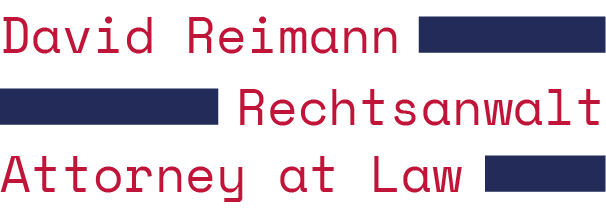Privacy Policy
This privacy statement explains how your personal data is handled when you visit the website of Attorney-at-Law David Reimann (hereinafter also referred to as “we” or “us”), write us messages or instruct us to provide legal advice. Personal data within the meaning of Art. 4 No. 1 of the General Data Protection Regulation (hereinafter: “GDPR“) is any information that relates to an identified or identifiable person.
Date of this privacy policy: 02/2024
1. Name and Contact Details of the Controller
Controller within the meaning of the GDPR and other data protection regulations:
Attorney-at-Law David Reimann (RAK Nuremberg)
Trabrennstrasse 2B
1020 Vienna
Austria
Tel: +43 1 997 4047
Fax: +43 1 997 4047 02
E-Mail: dr@reimann.legal
2. Processing of personal data
2.1 When visiting our website
We are committed to the principle of data minimization. For this reason, we process only the minimum necessary personal data during your purely informational visit to the website.
When you visit the website, the browser used on your terminal device automatically sends information to the website server. This information is temporarily stored in a so-called “log file”. Log files contain the following data:
- IP address of the requesting end device
- Date and time of the visit
- Name and URL of the retrieved file
- Browser and operating system of your end device.
The legal basis for the processing of the data is Art. 6 para. 1 lit. f) GDPR.
The data is stored to ensure smooth connection establishment, correct display and proper operation of the website. The data is also used to ensure comfortable use and optimization of the website and to ensure the security and stability of our information technology systems. An evaluation of the data for marketing purposes does not take place. The data is deleted again when it is no longer required for the above-mentioned purposes.
These purposes are also our legitimate interest in data processing according to Art. 6 para. 1 lit. f) GDPR. The collection of the data is absolutely necessary for the provision and operation of the website. There is no option for you to object.
In order to make visiting the website attractive and to enable the use of certain functions, we also use cookies. Cookies are text files that are stored in your browser or by the browser on your system. Cookies contain a string of characters that enables the browser to be uniquely identified when the website is called up again. With the help of cookies, the website can adapt its content to your interests more quickly. Cookies usually contain the name of the domain from which the cookie originates, the expiration period of the cookie and a randomly generated number. Cookies alone do not allow any conclusions to be drawn about your identity.
We only use cookies that are technically absolutely necessary for the secure operation of the website. They may therefore be set without your prior consent. Statistical, marketing or tracking technologies are not used, nor are cookies from third-party providers. Currently, only the cookie “wp_wpml_current_language” is used, which is required to store your language selection and expires when you leave the website (session cookie). Further processing of personal data with cookies does not take place.
2.2 When using the contact form on our website or contacting us by e-mail
When contacting us via the contact form on our website or by e-mail, your email address, the text of the e-mail and other data voluntarily provided by you will be collected and stored by us. The legal basis for the processing is Art. 6 (1) p. 1 lit. b) GDPR. We process the data you provide exclusively for the purpose of processing your contact request. If you subsequently commission us with the provision of legal consulting services, the personal data you provide will be further processed for the purpose of fulfilling our obligations under the mandate agreement (see section 2.4 below).
2.3 When contacting you by e-mail in the context of existing customer relationships
If you have sent us your e-mail address to initiate a contract or to make use of our services, we reserve the right to send you e-mails at irregular intervals in the future with information on similar service offers in which you have already expressed an interest (so-called direct advertising). No separate consent is required for this. The legal basis is our legitimate interest in personalized direct advertising from Art. 6 (1) p. 1 lit. f) GDPR. We process this data for the purpose of informing you about our services and, if necessary, working with you again in the future. You can object to this processing at any time by sending an e-mail to the responsible person named in section 1 (see also section 5 below).
2.4 Within the scope of our practice as lawyers
If it should become necessary, we will process your personal data for the proper fulfillment of our obligations under the mandate agreement, for example for invoicing or for asserting your claims against third parties and in court. For this purpose, we may also transmit your personal data to third parties (for example, courts, authorities, opponents and opponents’ representatives, legal counsels). Your personal data processed in this regard generally includes your name and address. However, depending on the specific mandate, the processing of further personal data may be necessary for the adequate provision of legal services. The legal basis for this data processing is Art. 6 (1) p. 1 lit. b) GDPR. If data of third parties is processed during the processing of the mandate, this data is processed on the basis of our legitimate interest pursuant to Art. 6 (1) p. 1 lit. f) GDPR. Lawyers are obliged to professional secrecy so that the data of third parties are also safe with us. Our legitimate interest in the processing of data for the proper handling of the mandate in this respect generally outweighs the interests of the third parties.
2.5 In the case of other disclosure of data
In some cases, we use external service providers to process your personal data (for example, for accounting and tax advice, Cloud-Services, billing services). These are carefully selected and commissioned by us. They are bound by our instructions and are monitored at regular intervals. The data is passed on for the purpose of the proper performance of our consulting activities as well as for the optimization of our internal processes. The legal basis for this processing is Art. 6 (1) p. 1 lit. f) GDPR. Our legitimate interest follows from the purposes of the processing, against which an interest worthy of protection in the non-disclosure usually does not exist. Apart from that, we will only pass on your personal data to third parties
- if you have given your consent in accordance with Art. 6 (1) p. 1 lit. a) GDPR,
- if the disclosure is necessary for the assertion, exercise or defense of legal claims in accordance with Art. 6 (1) p. 1 lit. f) GDPR and there is no reason to assume that you have an overriding interest worthy of protection in the non-disclosure of your data,
- if there is a legal obligation for the disclosure pursuant to Art. 6 (1) p. 1 lit. c) GDPR,
- and if this is legally permissible and necessary for the processing of contractual relationships with you according to Art. 6 (1) p. 1 lit. b) GDPR.
3. Data security
The security of your data is important to us. Your personal data is therefore transmitted using secure SSL or TLS encryption/connection. In addition, we secure our website and other systems through technical and organizational measures against loss, destruction, access, modification or distribution of your data by unauthorized persons. Despite regular checks, however, complete protection against all dangers is unfortunately not possible.
4. Storage period
The storage period of personal data depends on the respective statutory retention period, for example, according to commercial or tax law (e.g. retention periods under commercial and tax law). When the legal retention periods have expired, we delete the respective personal data as long as and insofar as the personal data is not required for the fulfillment or initiation of a contract or we no longer have a legitimate interest in storing it.
5. Your rights as data subject
You have the following rights against us:
- to request information about your personal data processed by us in accordance with Art. 15 of the GDPR;
- to demand the rectification of incorrect or incomplete personal data stored by us without undue delay in accordance with Art. 16 of the GDPR;
- to request the erasure of your personal data stored by us in accordance with Art. 17 of the GDPR, unless the processing is necessary in accordance with Art. 17 (3) of the GDPR;
- to request the restriction of the processing of your personal data in accordance with Art. 18 of the GDPR;
- to receive your personal data that you have provided to us in accordance with Art. 20 GDPR;
- to object to the processing of your personal data pursuant to Article 21 of the GDPR, provided that the processing was carried out on the basis of our legitimate interests within the meaning of Article 6 (1) p. 1 lit. f) of the GDPR. You can address the objection at any time to the responsible person named in section 1 above;
- to revoke your consent at any time in accordance with Art. 7 (3) GDPR,
- to complain to a supervisory authority in accordance with Art. 77 GDPR. The competent authority is usually the Austrian Data Protection Authority (https://www.data-protection-authority.gv.at/).

